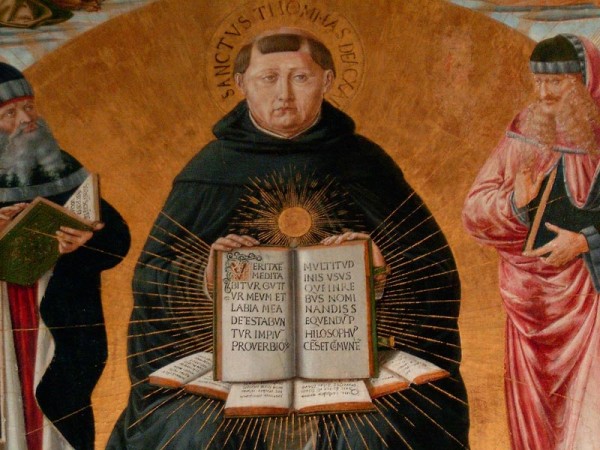St. Thomas Aquinas: Pro-Choice?

A friend of mine recently referred to the book “Good Church, Bad Church” by Tom Kane, a former Catholic priest. I read the synopsis on Amazon and read the extract on the author’s website. In the extract, a couple came to Kane while he was still a Catholic priest and he counseled them to have an abortion, calling upon St. Thomas Aquinas as justification:
“The great Catholic theologian, Saint Thomas Aquinas, whose theological reasoning is the foundation of Catholic morality, said that a fetus does not contain a soul until several months because there is not enough development yet to hold a soul, so the fetus, Thomas says, is not a person,” I said. “Yet the Vatican and the Vaticans of Protestantism would sacrifice an endless number of lives for a miniscule embryo that resembles an amoeba.”
“But the fetus has life,” he said.
“Yes, but what kind of life? Plant life? Animal life?” I said. “A fetus has a very primitive form of life—not yet a human life.”

I’m not sure if Kane offered any more of a defense in the book, but after reading the above extract, some problems with what he said immediately come to mind…
Problem #1: Aquinas’ theory about ensoulment was based off Aristotle, who asserted that something becomes human when it has “human form”. Limited to observations by the naked eye, it was thought that this took place after about forty days.
It is important to understand that Aquinas’ suggestion was made within the context of the primitive state of embryology of the 13th Century. However, embryology has come a long way since then, and we now have instruments such as the microscope. Thanks to genetics (courtesy of a Catholic monk, Gregor Mendel) we now know that the unborn have a unique human genetic code from the very moment of conception. It is not possible to assert that “A fetus has a very primitive form of life—not yet a human life”. If it has human DNA then it’s human and if it’s growing, then it’s alive… human life. If Aquinas knew what we know today about embryology and DNA he would certainly revise his thoughts concerning ensoulment.
Problem #2: Aquinas’ opinion was not the teaching of the Church and he would have been horrified to find that someone was using his writings against the Church which he loved so much.
Problem #3: Most importantly though, despite his thoughts concerning ensoulment, “the great Catholic theologian, Saint Thomas Aquinas” still held that abortion was gravely wrong, even prior to forty days. This was in accord with explicit teaching of the Church dating back to the First Century (see The Didache, Chapter 2).
I think it’s safe to say that St. Thomas was pro-life

See also:
http://www2.franciscan.edu/plee/aquinas_on_human_ensoulment.htm
Thanks for the link
Thanks Cale
Pingback: This Week's Best in Catholic Apologetics | DavidLGray.INFO
In the old Communist Yugoslavia, the most pro-life proponent was converted, while completely oblivious about Saint Thomas Aquinas, to a pro life position that meant he and his family had to endure tremendous persecution until the Communist regime ended. Part of his story is extracted below:
“In describing his conversion to La Razon, Adasevic “dreamed about a beautiful field full of children and young people who were playing and laughing, from four to 24 years of age, but who ran away from him in fear. A man dressed in a black and white habit stared at him in silence. The dream was repeated each night and he would wake up in a cold sweat.
One night Stojan asked the man in black and white in his frightening dream as to his identity.
“My name is Thomas Aquinas,” he responded. Stojan, educated in communist schools that pushed atheism instead of real learning, didn’t recognize the Dominican saint’s name.
Stojan asked the nightly visitor, “Who are these children?”
“They are the ones you killed with your abortions,” St. Thomas told him bluntly and without preamble.”
This doctor went on to explain that perhaps Saint Thomas was sent to make amends for his error in the summa.
Saint Thomas set the summa aside as straw in the last three weeks of his life.
Hey Andrew, welcome to Restless Pilgrim!
I hadn’t heard that story before but I’ve since read about it. You can’t be too hard on St. Thomas – he was doing the best with what the science of his time had to offer.
Regarding the Summa, I don’t think we should take his decision to set it aside as a retraction of what he had written. Compared with a vision of Heaven, I think all our earthly toils would seem like straw…
God bless,
David.